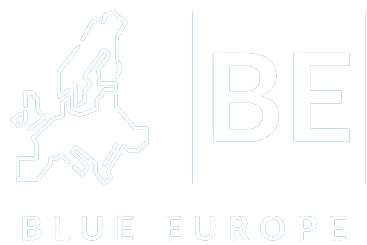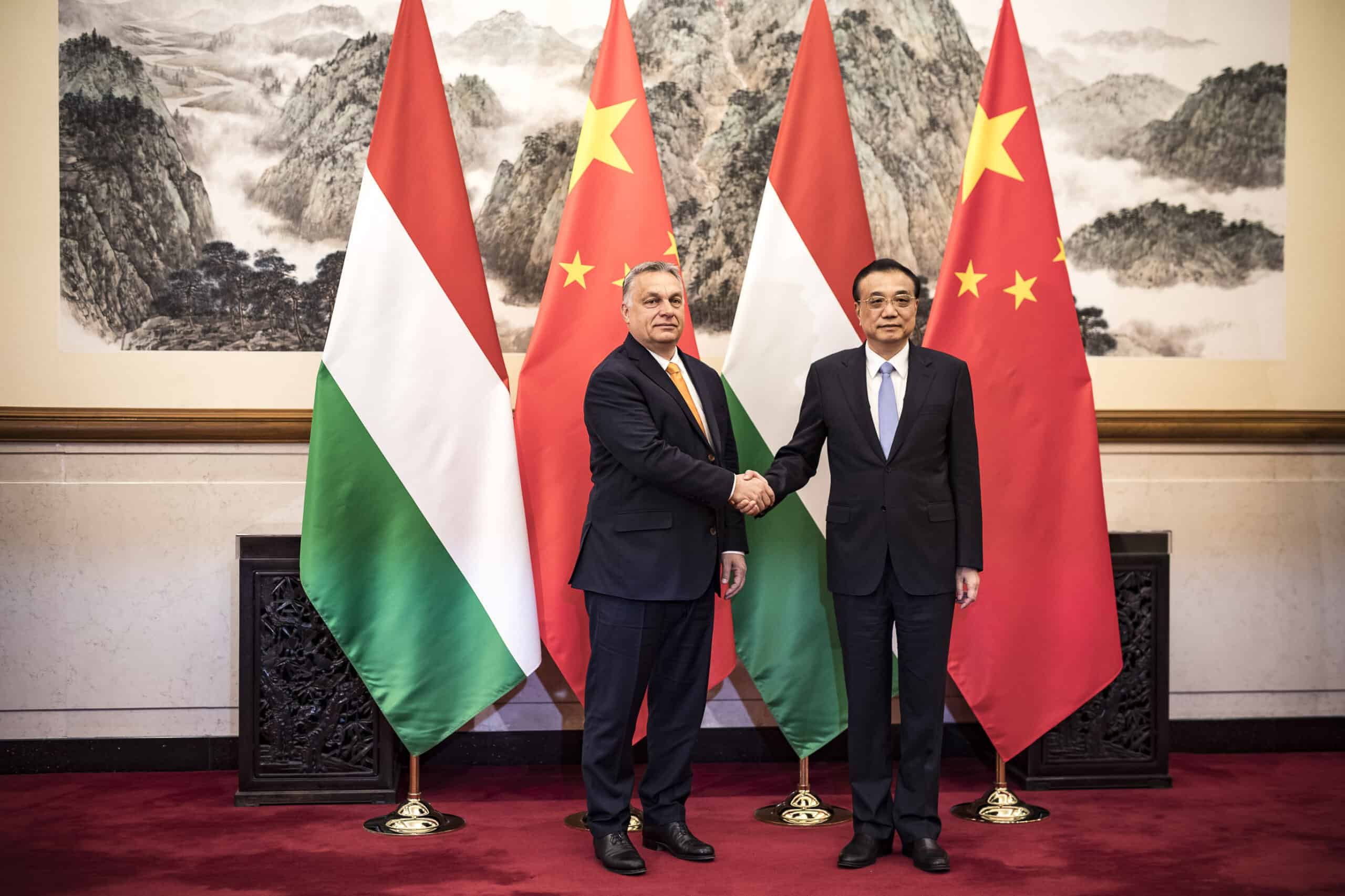Réka Koleszár – Indipendent Researcher
Réka Koleszár is an independent researcher focusing on the relations between the European Union and Asia, in particular East Asia. Her experience spans international organisations and think tanks including working for the Council of the European Union and the European Policy Centre. Réka holds an MSc in Political Science from Leiden University, an MA in International Relations specialising in East Asian studies from the University of Groningen, and a diploma in the Art of Diplomacy from the European Academy of Diplomacy (LinkedIn).
This contribution is part of the book “The Dragon at the Gates of Europe: Chinese presence in the Balkans and Central-Eastern Europe” (more info here) and has been selected for open access publication on Blue Europe website for a wider reach. Citation:
Réka, Koleszár, Chinese influence in Hungary: a multifaced relationship, in: Andrea Bogoni and Brian F. G. Fabrègue, eds., The Dragon at the Gates of Europe: Chinese Presence in the Balkans and Central-Eastern Europe, Blue Europe, Dec 2023: pp. 357-375. ISBN: 979-8989739806.
1. Introduction
China and Hungary share a long-standing relationship looking back over more than 70 years. Upon the founding of the People’s Republic of China in 1949, Hungary was among the first to recognise the newly created communist state. Having gone through several ups and downs, the bilateral relationship has developed rapidly in recent years, in particular since the 2010s.
Hungary eagerly joined the previous 16+1 Cooperation transregional platform and was the first European country to sign a memorandum of understanding over China’s Belt and Road Initiative (BRI) – and is now the last standing EU partner in it.
In 2017, President Xi Jinping and PM Orbán jointly announced the upgrade to a ‘comprehensive strategic partnership’ from the previous ‘friendly and cooperative partnership’ signalling the new impetus. The present momentum in the 2020s, hailed as the “best period in history” by China’s Foreign Minister Wang Yi, has permeated the full spectrum of Hungary-China relations.[1] The increasingly close ties have drawn concerns from Hungary’s Western partners over the extent of Chinese influence in the Eastern European country.
2. Political Level – A welcome with open arms
Hungary does not have an official China strategy, but in 2010, the second Orbán government announced the ‘Eastern Opening’ policy which essentially provides the cornerstone of the country’s approach to China. The much-discussed foreign policy directive came about to diversify Hungary’s export structure and attract new foreign direct investment (FDI) while reducing its dependency on Western partners. In terms of the factual economic results, the success of the policy is contested as 89% of investments still come from within the EU.[2] Its impact on intensifying the political and diplomatic ties between Beijing and Budapest however is beyond doubt. Over the past decade, several high-level meetings took place and from 2017 onwards, the leaders of the two countries have exchanged dialogue annually – with the exception of 2022.
While the EU and many of Hungary’s allies are on a path to an increasingly cautious approach towards China, the Hungarian leadership is on a different track. In the words of the Hungarian Foreign Minister Péter Szijjártó, “Hungary does not see China as a risk or a threat, but rather as a state with which we can gain many benefits through cooperation.”[3] The government’s often highly visible – though arguably symbolic – favours towards China earned it the notion of Beijing’s most reliable European ally.[4] Hungary has tried to leverage the close ties and put pressure on its European partners who are considering withholding funds because of concerns over the rule of law and the democratic backsliding in the country. In 2018, Orbán stated, “Central Europe needs capital to build new roads & pipelines. If the EU is unable to provide enough capital, we will just collect it from China.”[5]
Hungary also seems ready to forgo a sense of EU unity and veto joint statements which would be uncomfortable for the Chinese Communist Party (in 2021, on China’s national security law in Hong Kong and in 2016, on the South China Sea ruling). Although EU statements are important ways to reinforce unity between the Member States, in effect, they have no direct consequences. Hungary’s actions had no real costs to the Union – apart from further straining the already tense relations between Budapest and Brussels. On the other hand, they reinforced the notion of ample Chinese influence in Hungary and likely courted some in Beijing. It is good to note that when it came to high impact decisions, Hungary did vote with the bloc to sanction Chinese entities and individuals for human rights violations in Xinjiang under the Magnitsky Act. Even so, the resolution was later publicly criticised by Szijjártó on his Facebook page – a likely courtesy attempt towards Beijing as Chinese media widely reshared the Hungarian minister’s words.[6]
This event displays Hungary’s careful balancing act between its Eastern partner and traditional transatlantic allies. Though the latter is increasingly concerned over Hungary’s alignment and the possibility of Chinese coercion, Beijing does not hold much sway over the country and Budapest’s positioning is primarily driven by Orbán’s personal agenda. It also does not reflect a country-wide attitude towards China, which means, should Orbán’s Fidesz party fall short in a future election, the relations might take an entirely different course. Nonetheless, the current Chinese presence in Hungary does pose some challenges for the EU and NATO, primarily in terms of security. An illustrative example of this is the case of the Chinese telecommunications company, Huawei. The company has been flagged as a national security risk by the US government and subsequently banned or restricted from several EU members’ 5G infrastructure but was welcomed with open arms in Hungary. While the company seems to be retreating from the European market after several accusations, Hungary remains its vocal supporter. In fact, Hungary hosts Huawei’s largest logistics hub on the European continent and in 2022, it held Huawei’s annual Innovation Day event.[7] And while the EU is considering a bloc-wide ban on using Huawei in 5G networks, Szijjártó stated that “We maintain our position regarding global telecommunications suppliers: that no one should be excluded from competition based on their country of origin. Hungary will continue to provide an open and fair economic and business environment for foreign investors, where the only criterion is that companies must respect Hungarian laws and regulations.”[8] Huawei has a strategic partnership with the country and already plays a major role in state infrastructure providing Hungary’s (and Europe’s) first smart 5G railway port, the East-West Gate.
Next to Hungary’s friendly political stance towards China in European and international debates – the latest example being Budapest’s support for China’s ‘peace plan’ to resolve Russia’s invasion of Ukraine[9] – officials also routinely amplify the close cooperation in domestic public communications. China is primarily presented as a partner from whom Hungary can benefit tremendously and Chinese investments are heralded to ensure the country’s economic growth and create jobs. The Hungarian Prime Minister noted China’s ascend and the US’s descent in world politics on several occasions and pro-government media reinforces the narrative that ‘China is the future.’ The welcoming approach of Hungarian officials and the favourable narrative it creates are perhaps why China has not spent much effort on major public diplomacy campaigns. Unlike in neighbouring countries, the Chinese Embassy in Budapest has not engaged in wolf-warrior diplomacy or the spread of rampant propaganda. Albeit more subtle operations trying to influence public perceptions are certainly present, such as the broadcasting of Chinese programs in Hungarian radio stations owned fully or partially by Chinese companies, their impact is limited at best.[10] The Hungarian government’s policy provides Beijing with a friendly and reliable political climate in Hungary which in turn translates to the country attracting by far the largest amount of FDI from China in the CEE region.
3. Economic sphere – The favourable Chinese way
In terms of economic relations, the overall trade volume has been growing steadily but unevenly. On one hand, Hungary’s export to China remains negligible, staying continuously below 2% (EUR 2.18B). On the other hand, import from China has been increasing at a greater speed, putting the country in third place as Hungary’s top source of import by 2022 and reaching the value of EUR 10.23B.[11] The vast majority of imports are electronic equipment, machinery and chemical products. This imbalance has resulted in a trade deficit of EUR 8.05B for Hungary. While trade deficits are not necessarily negative, a high and persistent deficit is often associated with job losses and the weakening of local currency, both of which are important risk factors for the growth of the Hungarian economy.
Concerning incoming investments, despite the CEE region receiving only about 3-5% of the total Chinese Europe-bound FDI, the share of Hungary is notable. The country is the number one destination in the region and is among the top four countries (next to the UK, France and Germany) attracting 88% of Chinese investment in Europe.[12] Studies have shown that while traditional economic considerations would not necessarily warrant the country to be the most attractive destination for investment in the region (despite the changes enacted by the authorities such as tax cuts and visa programs), the close political ties combined with Hungary’s large Chinese diaspora have a profound effect.[13] While this may give the impression that the government’s turn towards China has not been without great economic avail, Chinese investment is estimated to be around only 4% of the total FDI in the country.[14] Defying this trend, 2022 saw about 20% of FDI coming from China which was almost entirely driven by the Chinese Contemporary Amperex Technology Co., Limited (CATL)’s massive investment in a battery plant construction in Northern Hungary.[15]
Most Chinese companies enter with market-seeking motivations and tend to turn their Hungarian operations into regional centres for European and North African markets (such as Huawei, Lenovo, or ZTE Corporation). Though greenfield investments would be the preferred mode of entry for Hungary to create jobs, most Chinese investors enter through mergers & acquisitions and joint ventures. As previous research found, Chinese capital tends to be opaque, increasing the risk of corruption which is well-displayed in the case of the joint Budapest-Belgrade Railway venture. The costly infrastructure development, often flagged as the BRI’s European flagship project, has been lagging for several years and is now facing further setbacks. Investigative journalists, interviewing a former Hungarian diplomat to Beijing, revealed that problems began when China insisted on its own companies carrying out the construction – a difficult request in a country where one group tends to win all public procurements on this scale. [16] Eventually, a Hungarian-Chinese consortium got the contract consisting of two Chinese state railway builders and a company of Orbán’s childhood best friend, Lőrinc Mészáros, known as Hungary’s wealthiest man. In 2020, using the emergency powers granted because of the COVID-19 pandemic, the Hungarian government marked all documents related to this project as classified for 10 years. Later it was exposed that the censoring happened on Chinese request.[17] As of 2023, the project faces significant budget overruns and the work on the railway is suspended because its proposed security system failed to meet EU standards. The Chinese side has allegedly stopped the funding and a solution is expected to be found only at the highest political level during the Hungarian PM’s upcoming trip to Beijing.[18]
The case of the railway project is just one of several blurry deals between China and Hungary from which the business circle around the Hungarian government appeared to profit (notable examples include the golden visa scheme, the vaccine procurement[19] and ventilator purchases during the pandemic.)[20] While the economic cooperation between the two sides undoubtedly increased over the years, it is debated to what extent has the national economy benefitted from it. As Hungary slips further away from being a liberal democracy under the Fidesz government, funding and investment are becoming harder to attain from the EU and Western partners. The less regulated and obscure Chinese capital fills the gap and plays into the clientelist corruption, which fuels the continuation of the current regime. Looking at traditional economic indicators, studies have concluded that China has little economic power in Hungary in terms of trade and investment, but its influence in maintaining Orbán’s clientelism should not be overlooked. [21]
4. Public Discourse – Growing concerns
Hungary is home to the largest Chinese diaspora in the CEE region (about 30,000 as of 2023) who have arrived in many waves starting from the early 1990s. The first Chinese immigrants, unskilled, hard-working people, came from mostly rural areas and settled down on the outskirts of Budapest, selling imported clothing from the mainland. At its peak, the Chinese community in the country counted about 50,000 members. The second major wave took place between 2013 and 2017 in the framework of the Hungarian government’s golden visa program. It mostly attracted middle-class families from metropolitan areas who came in search of a calmer, European lifestyle and who continued to rely on income from China. During the four years of the program, 18,000 residence permits were acquired by Chinese immigrants (each costing EUR 250.000-300.000).[22] Considering their relatively long presence in the country coupled with the Hungarian government’s exceptionally friendly stance towards Beijing and the high visibility of Chinese projects, one would assume a high degree of societal acceptance and favourable public discourse. Despite that, Hungarians do not hold very positive views of the Asian country.
Though there are no conflicts between Hungarians and the Chinese diaspora, a survey conducted in 2016 found that 53% of Hungarians would not like to have Chinese neighbours.[23] To many, the general impressions of Budapest’s Chinatown are fake goods and high corruption. Public perceptions have worsened after COVID-19, with over 40% of Hungarian people thinking that the virus was intentionally made and spread by China.[24] More recently, in 2023, a survey by the Pew Research Center found that around half of the population have a negative outlook on China and only 36% of those who consider China the world’s leading economic power see its status to be positive for Hungary.[25]
Some recent Chinese projects gave way for the manifestation of this sentiment – despite foreign affairs rarely being the focus of the Hungarian public’s attention. In 2021, the government announced the plan of opening the first European campus of Fudan University in Budapest which met with unprecedented backlash and furious street protests.[26] The main trigger was the location of the planned campus as it would have taken over the space destined for low-cost residency for domestic students. Besides, leaked documents revealed that the project would have been financed through massive Chinese loans and carried out by Chinese contractors which further angered protesters. This instance led to greater public scrutiny over Chinese investments in the country drawing accusations of corruption and the misuse of state funds.[27] As of 2023, the plans have been put on ice, but the Hungarian foundation (Fudan Hungary Egyetemért Alapítvány) which was created to maintain the campus and was given EUR 36.4MM in state funds to do so, remains. In fact, despite the project’s uncertain future, payouts for those involved have increased over the years.[28]
As the public takes a greater interest in the conditions around Chinese projects and loans and the examples of the repercussions of other countries’ Chinese debt stories make their rounds in Hungarian media, the initial enthusiasm (whether it was there at all) is dropping. One of China’s most recent investments – the planned CATL battery plant has been hailed as Hungary’s largest-ever investment (at EUR 7.9B) but faced considerable local backlash.[29] The grassroots opposition cited environmental reasons[30] and concerns about incoming foreign workers also appeared.[31] While the local protests are unlikely to turn into wider national opposition, their impact should not be underestimated as changes to reduce the original size of the factory are now under consideration.[32]
The latest in line of controversial Chinese projects is the leaked plan for a chemical distribution hub in Budapest.[33] According to the plan, China would transport the majority of its chemical production intended for Europe to Hungary by rail which would then be distributed to other locations on the continent. Several concerns emerged about the safety and long-term impact of the project after which the government briefly commented that it does not support the creation of chemical distribution hubs. At the same time, a request to publish a letter written by Antal Rogán – the responsible minister for the project – in support of the Chinese side’s proposal, was rejected citing that it contains sensitive data related to decision-making.[34] At this point, as the government denies the plans, the future of the hub is unclear – which makes it fit well into the list of delayed or stalled, opaque Chinese projects in the country.
5. Conclusion
As concerns are growing over China’s increasing global presence in some parts of the world, the close political ties and the spiralling investments have rightly drawn attention to Chinese influence in Hungary.
Although traditional economic indicators do not justify China’s power in the country, the Hungarian government’s approach and domestic communication provide a clue about China’s importance. The Orbán government has benefited from the non-transparent Chinese projects such as the Budapest-Belgrade railway or the proposed Fudan University campus by overplaying their significance in front of the domestic audience, by providing opportunities for corruption to government-friendly business circles and by showing off the investments to Western partners who criticise the state of Hungarian democracy and withhold funds.
Lacking society-wide backing and clarity over the extent it contributed to Hungary’s national economy and foreign perception, it is unlikely that the China-friendly approach would be followed in case of a change of government. Until then, Hungary’s stance is not expected to alter significantly. Overall, while China does not have the kind of leverage in Hungary that some European capitals envision, there may be some lengths the government would be willing to go to uphold the current momentum which could come at the expense of its Western allies.
References
- “Wang Yi Meets with Hungarian Foreign Minister Péter Szijjártó,” Ministry of Foreign Affairs of the People’s Republic of China, May 15, 2023, https://www.fmprc.gov.cn/eng/wjdt_665385/wshd_665389/202305/t20230517_11078857.html. ↑
- “Hungary – Investment Climate Statement,” International Trade Administration | Trade.gov, November 25, 2022, https://www.trade.gov/country-commercial-guides/hungary-investment-climate-statement. ↑
- Ádám Bráder, “Szijjártó: The EU Will Lose out If It Views China as a Rival,” Hungarian Conservative, May 16, 2023, https://www.hungarianconservative.com/articles/current/szijjarto_china_eu_economy_investment_cooperation/. ↑
- Kawala Xie, “‘China-Friendly’ Hungary Hails Beijing’s Peace Efforts in Ukraine,” South China Morning Post, May 16, 2023, https://www.scmp.com/news/china/diplomacy/article/3220752/china-friendly-hungary-hails-beijings-peace-efforts-ukraine-during-meeting-between-top-diplomats.;
Dalibor Rohac, “How Viktor Orbán Became China’s Most Reliable European Ally,” American Enterprise Institute, July 1, 2021, https://www.aei.org/op-eds/how-viktor-orban-became-chinas-most-reliable-european-ally/. ↑
- Srinivas Mazumdaru, “EU Wary of China’s Growing Ties to Eastern Europe,” dw.com, July 5, 2018, https://www.dw.com/en/eu-fears-divisions-as-china-woos-eastern-european-nations/a-44542971. ↑
- Post on March 22 ,2021 with the title “Brüsszeli szájkarate: valós megoldások helyett szankciós lista”) https://www.facebook.com/szijjarto.peter.official ↑
- Laurens Cerulus and Sarah Wheaton, “How Washington Chased Huawei out of Europe,” POLITICO, November 29, 2022, https://www.politico.eu/article/us-china-huawei-europe-market/. ↑
- Ádám Bráder, “Hungary at the Forefront of Digitalisation,” Hungarian Conservative, May 15, 2023, https://www.hungarianconservative.com/articles/current/digitalisation_hungary_huawei_china_agreement_nke_scholarship/. ↑
- Wilhelmine Preussen, “Orbán Backs China’s Ukraine Peace Plan,” Politico Europe, February 27, 2023, https://www.politico.eu/article/viktor-orban-hungary-ukraine-china-peace-plan-russia-invasion/#:~:text=Hungarian%20Prime%20Minister%20Viktor%20Orb%C3%A1n%20said%20that%20his%20country%20supports,position%20on%20the%20Beijing%20proposal. ↑
- See: https://magyarnarancs.hu/sorkoz/kinat-nepszerusito-musorkent-fut-a-radioban-valojaban-nyilt-agymosas-239199, https://www.direkt36.hu/en/kemjatszmakat-hozott-budapestre-orban-kinai-nyitasa/ ↑
- “Hungary Export & Import by Country,” Trading Economics, accessed September 12, 2023, https://tradingeconomics.com/hungary/exports-by-country. ↑
- Agatha Kratz et al., “Chinese FDI in Europe: 2022 Update,” Rhodium Group, May 9, 2023, https://rhg.com/research/chinese-fdi-in-europe-2022-update/#:~:text=Investment%20concentrates%20heavily%20on%20the,of%20the%20year%27s%20M%26A%20activity. ↑
- Agnieszka McCaleb and Ágnes Szunomár, “Chinese Foreign Direct Investment in Central and Eastern Europe,” Repository of the Academy’s Library, September 1, 2017, http://real.mtak.hu/80610/. ↑
- Tamás Matura, “Chinese Influence in Hungary,” CEPA, April 15, 2023, https://cepa.org/comprehensive-reports/chinese-influence-in-hungary/. ↑
- Agatha Kratz et al., “Chinese FDI in Europe: 2022 Update,” Rhodium Group, May 9, 2023, https://rhg.com/research/chinese-fdi-in-europe-2022-update/#:~:text=Investment%20concentrates%20heavily%20on%20the,of%20the%20year%27s%20M%26A%20activity. ↑
- Szabolcs Panyi, “How Orbán’s Eastern Opening Brought Chinese Spy Games to Budapest,” Direkt36, December 9, 2021, https://www.direkt36.hu/en/kemjatszmakat-hozott-budapestre-orban-kinai-nyitasa/. ↑
- “Kínai Kérésre Titkosították a Budapest-Belgrád Vasút Hitelszerződését,” Belföld, September 5, 2022, https://24.hu/belfold/2022/09/05/budapest-belgrad-vasutvonal-hitelszerzodes-kiadas-per/. ↑
- Fanni Forgács, “Budapest–Belgrade Railway in Big Trouble, PM Orbán Travels to Bejing to Find a Solution,” Daily News Hungary, September 23, 2023, https://dailynewshungary.com/budapest-belgrade-railway-in-big-trouble-pm-orban-travels-to-bejing-to-find-a-solution/. ↑
- Sui-lee Wee and Benjamin Novak, “Hungary Pays Big for a Chinese Vaccine,” The New York Times, March 12, 2021, https://www.nytimes.com/2021/03/12/world/hungary-sinopharm-covid.html#:~:text=Hungary%20has%20agreed%20to%20pay,most%20expensive%20in%20the%20world. ↑
- Blanka Zöldi, “The Government Boasted about Ventilator Purchases, yet Hungary Made the Worst Deals across the EU,” Direkt36, August 27, 2020, https://www.direkt36.hu/en/a-kormany-dicsekedett-a-lelegeztetogepek-vasarlasaval-megis-ok-kotottek-a-legrosszabb-uzletet-kinaval-az-egesz-eu-bol/. ↑
- See: Tamás Matura, “Chinese Influence in Hungary,” CEPA, August 22, 2022, https://cepa.org/comprehensive-reports/chinese-influence-in-hungary/.; Edit Zgut-Przybylska, “A Lucrative Relationship: Clientelist Corruption Underpins Orbán’s China Policy,” Map Influence, June 2022, https://mapinfluence.eu/wp-content/uploads/2022/07/policy-paper_lucrative-relationship_A4_04.pdf. ↑
- Pál Nyíri, “Why Middle-Class Chinese Are Moving to Hungary,” global e-journal, February 21, 2020, https://globalejournal.org/global-e/february-2020/why-middle-class-chinese-are-moving-hungary. ↑
- Ádám, Kolozsi, “Sosem Látott Mértékű A Magyarországi Idegenellenesség,” Index, November 17, 2016, https://index.hu/tudomany/2016/11/17/soha_nem_latott_merteku_az_idegenellenesseg_magyarorszagon/. ↑
- Tamás Matura, “Hungary: No Need for a Chinese Soft-Power Strategy from China,” China’s Soft Power in Europe: Falling on Hard Times, 2021, https://www.jstor.org/stable/resrep32152.14. ↑
- Laura Silver, “China’s Approach to Foreign Policy Gets Largely Negative Reviews in 24-Country Survey,” Pew Research Center’s Global Attitudes Project, July 27, 2023, https://www.pewresearch.org/global/2023/07/27/chinas-approach-to-foreign-policy-gets-largely-negative-reviews-in-24-country-survey/. ↑
- Szabolcs Panyi, “The Fight over Fudan: A Chinese University in Budapest Sparks Reckoning for Sino-Hungarian Relations,” chinaobservers, June 7, 2021, https://chinaobservers.eu/the-fight-over-fudan-a-chinese-university-in-budapest-sparks-reckoning-for-sino-hungarian-relations/. ↑
- Akos Keller-Alant and Reid Standish, “What’s next for China’s Fudan University Campus in Hungary?,” RadioFreeEurope/RadioLiberty, June 8, 2022, https://www.rferl.org/a/hungary-orban-china-fudan-budapest/31888800.html. ↑
- Adél Hercsel, “Nyoma Veszett a Fudan-Alapítványnak Miután 14 Milliárd Állami Vagyont Kapott,” Napi.hu, July 11, 2023, https://www.napi.hu/magyar-gazdasag/eltunt-fudan-egyetem-tompos-marton.773973.html. ↑
- Zoltán Simon, “Chinese Battery Plant Investment Faces Local Backlash in Hungary,” Bloomberg.com, January 20, 2023, https://www.bloomberg.com/news/articles/2023-01-20/chinese-battery-plant-investment-faces-local-backlash-in-hungary?in_source=embedded-checkout-banner. ↑
- “Hungary Protests against Chinese Battery Plant Defy ‘Orbanomics,’” France 24, February 10, 2023, https://www.france24.com/en/live-news/20230210-hungary-protests-against-chinese-battery-plant-defy-orbanomics. ↑
- Andrew Higgins, “A Hungarian Town Seethes over a Giant Chinese Battery Plant,” The New York Times, March 15, 2023, https://www.nytimes.com/2023/03/15/world/europe/hungary-china-battery-plant.html. ↑
- “Changes on the Horizon for the Largest Battery Company’s Investment,” Hungary Today, August 3, 2023, https://hungarytoday.hu/changes-on-the-horizon-for-the-largest-battery-companys-investment/. ↑
- Szabolcs Panyi and Kamilla Marton, “Kínai Vegyi Anyagok Elosztóközpontjává Válna Magyarország, Rogán És Köre Tűnik Fel a Projekt Mögött,” Telex, June 27, 2023, https://telex.hu/direkt36/2023/06/27/kinai-vegyianyagok-eloszto-kozpontjava-valna-magyarorszag-rogan-es-kore-tunik-fel-a-projekt-mogott. ↑
- “Az Orbán-kormány szerint hírlapi kacsa, hogy kínai vegyianyag-elosztó épülne, de azt nem árulja el, hogy akkor milyen döntést készítenek elő,” Népszava, August 7, 2023, https://nepszava.hu/3204488_kormanyzati-tajekoztatasi-kozpont-kina-vegyianyag-eloszto-reakcio. ↑





